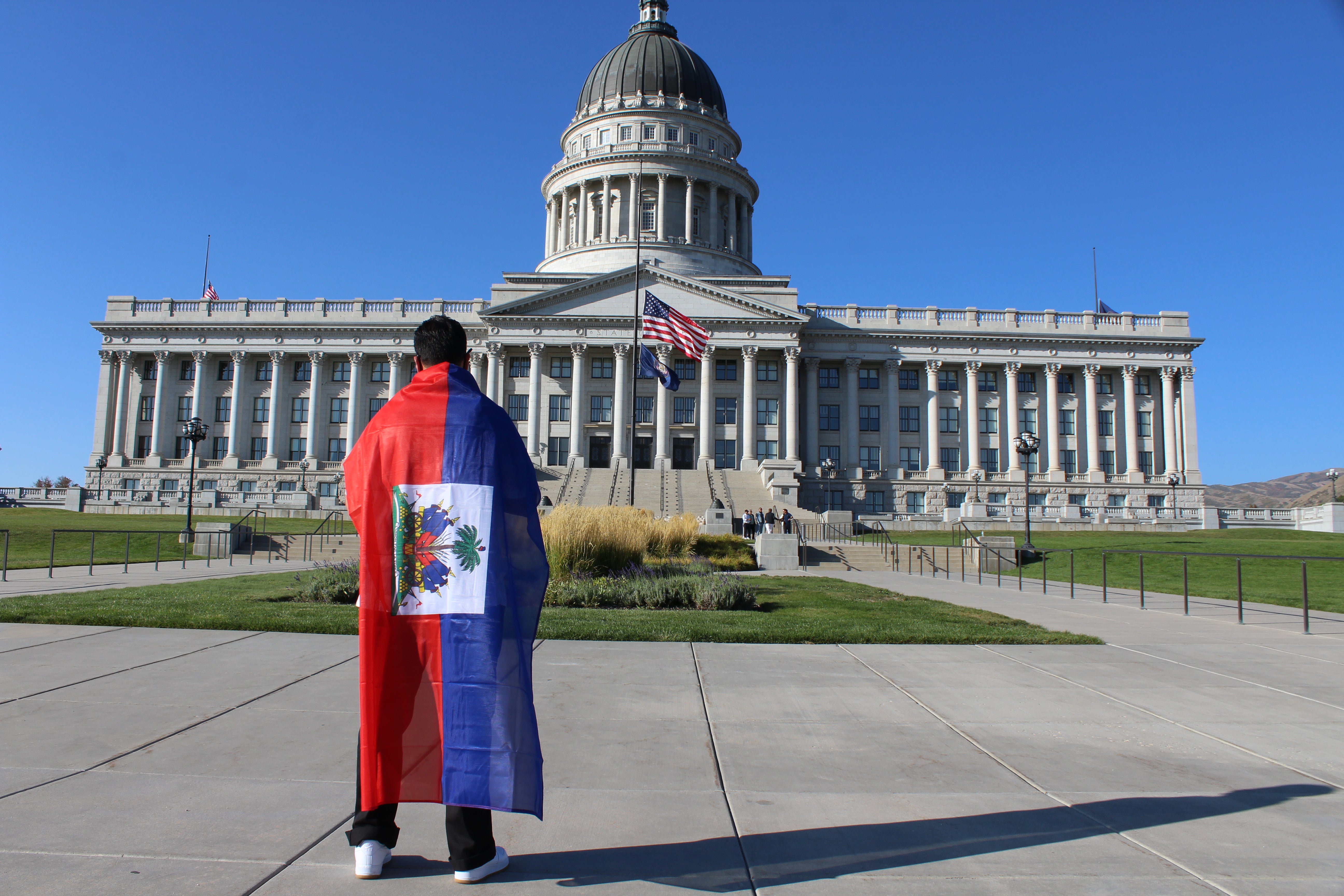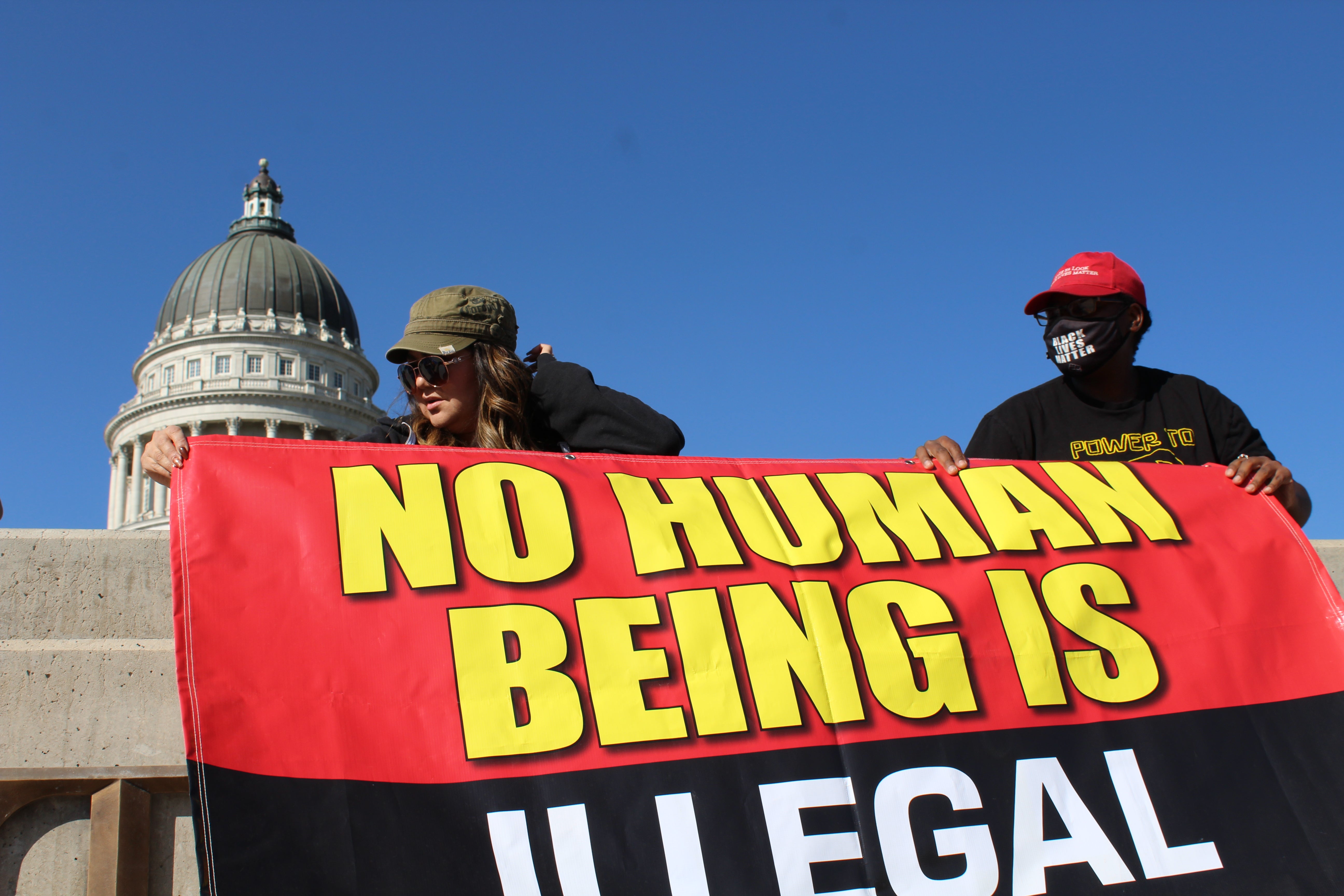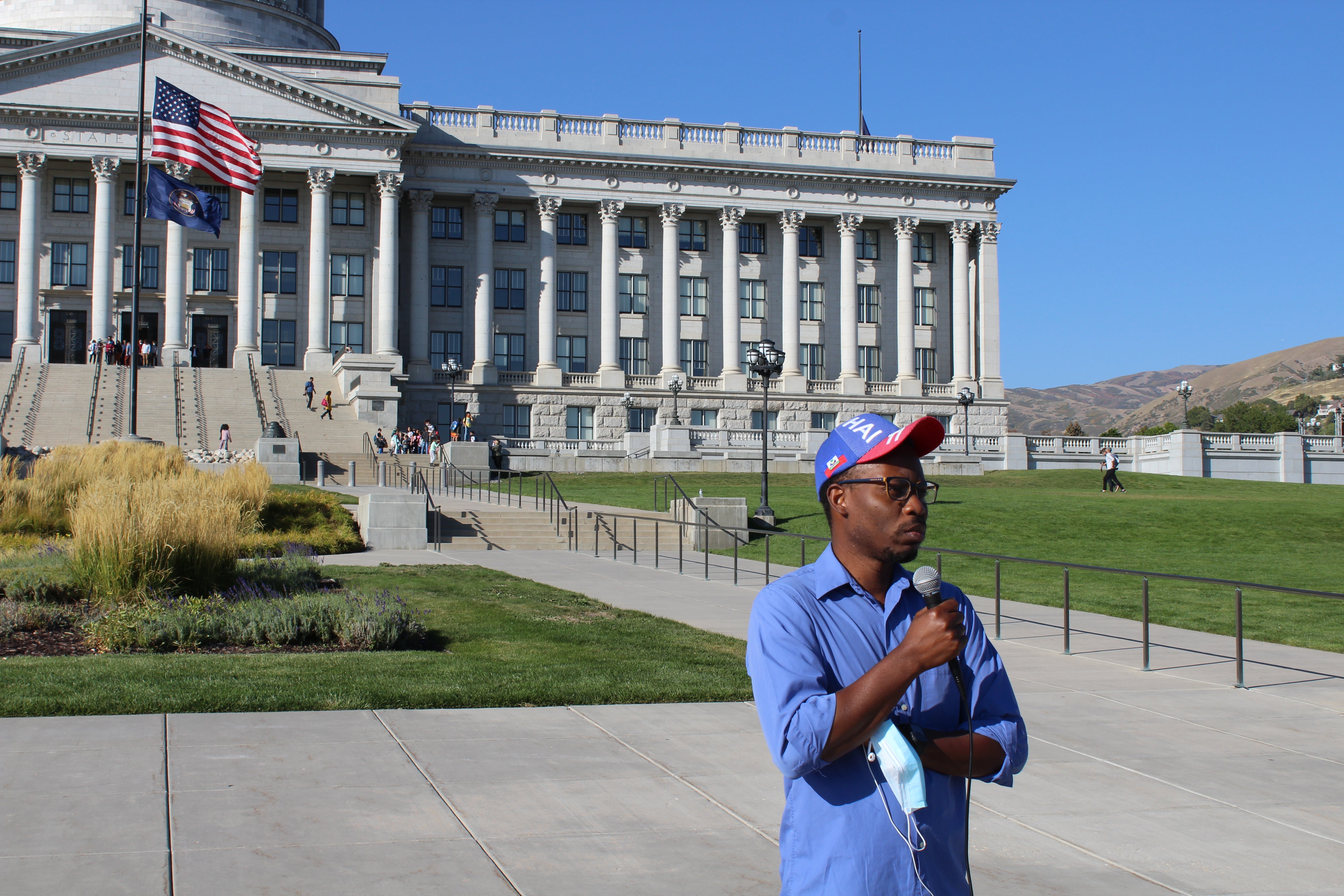‘Beyond unacceptable’: Haitian immigrant supporters rally in Salt Lake City
Group gathered at the Utah Capitol to denounce ‘sickening’ treatment captured in viral Del Rio pictures

Your support helps us to tell the story
From reproductive rights to climate change to Big Tech, The Independent is on the ground when the story is developing. Whether it's investigating the financials of Elon Musk's pro-Trump PAC or producing our latest documentary, 'The A Word', which shines a light on the American women fighting for reproductive rights, we know how important it is to parse out the facts from the messaging.
At such a critical moment in US history, we need reporters on the ground. Your donation allows us to keep sending journalists to speak to both sides of the story.
The Independent is trusted by Americans across the entire political spectrum. And unlike many other quality news outlets, we choose not to lock Americans out of our reporting and analysis with paywalls. We believe quality journalism should be available to everyone, paid for by those who can afford it.
Your support makes all the difference.Carrying signs emblazoned with messages like “Stop racist attacks on Haitians” and “Refugees make America Great”, a small group of Salt Lake City residents came together at the state Capitol on Friday to decry potential abuse and demand better treatment of Haitian migrants seeking asylum along the US-Mexico border.
The gathering came in response to images out of Del Rio, Texas, that appeared to show mounted US Customs and Border Protection (CBP) agents twirling their reins in a whipping motion while chasing down mostly Black migrants.
On Monday, White House press secretary Jen Psaki called the actions depicted in the stills “horrific” – the same word she used that day to describe the botched 29 August Kabul airstrike that left 10 civilians dead, including seven children. The following day, the Department of Homeland Security, which oversees CBP, labeled the photographs as “extremely troubling”. By midweek, National Border Patrol Council vice president Art Del Cueto said agents acted “within policy” by using techniques designed to protect horses during a Fox News appearance. The whirlwind week was bookended by US officials clearing the Del Rio encampment, estimated to have been upwards of 10,000 strong.
Still, for people like community organiser Natasha Cadet, the effect of the pictures lingers.
“It’s not a Haitian issue, it’s not a Black issue, it’s a human rights issue,” Ms Cadet told The Independent.
Calling on the July assasination of Haiti President Jovenel Moïse, and the ensuing 7.2-magnitude earthquake that rocked the caribbean nation – leaving at least 2,207 people dead and 344 still missing – Ms Cadet said it was “inevitable that people would be seeking asylum”.
She chose the statehouse setting as a way of sending a message to Utah senators Mike Lee and Mitt Romney that comprehensive immigration reform, including the revocation of the controversial Title 42, is past due. “It’s wrong,” she said. “The US was built on immigrants. The US was built on asylum seekers. And now we turn around and deny other people that? It’s not right.”
Ms Cadet, who is of Haitian descent, said she noticed a lack of empathy and overall interest in the story. “I wasn’t seeing people on social media outraged, so I was, like, ‘OK, no.’ If we let it, they will sweep this under the rug, they will just keep going, so we have to make noise.”
Latinx activist Martha Black was there to do just that. “I’m going to get f***ing loud because I’m f***ing pissed,” Ms Black, who called the Del Rio images “beyond unacceptable”, said, bullhorn in hand. “This is not a Trump issue, a Biden issue, a Clinton issue. This is an issue that has been going on for decades,” she continued. “It was our turn the last term, Mexicans. We experienced the oppression; we experienced our children and our families being separated and treated worse than animals. Now it’s our brothers from Haiti.”

Ms Black highlighted the number of people at the rally, around 15, and decried: “Where is our anger from a year ago when they were sterilizing immigrant women in the detention centers? We were all f***ing mad about that.”
Friday’s turnout stood in stark contrast to a candlelight vigil in honor of Gabby Petito held a couple of days prior in the city’s tony Sugar House neighborhood, which managed to draw 10 different media outlets.
“What happened today? Where’s everybody?” Ms Black enquired. “Where’s Black Lives Matter? Where’s Mormon Women for Ethical Government?”
Ms Black also called out local fair-weather demonstrators who came out in droves following the murder of George Floyd, but were nowhere to be found that day.
“We need to stand up and we need to call out our activist community,” she said. “I’m truly disappointed that a lot of people who claim to care about human rights are not here. So are we just doing this for show? Are we just doing this when it’s popular? When the media is here and we want our faces in the newspaper?”
‘I know this is not America’
For at least one attendee, the turnout was just right.
Rony Charles happened to be driving past the Capitol building when he noticed a Haitian flag waving in the air. Immediately, he parked his car, reached for a hat displaying the colours of his home country’s sigil and curiously approached the compact assembly.
“Thank you so much,” Mr Charles, who arrived in Utah from Haiti to attend Brigham Young University and later came back to build a life here, said during an improvised speech. “The great thing about America , I can tell you, is that you see people from all over. I think that’s what makes it beautiful. It doesn’t matter your race or where you’re from. We’re all here looking for the same thing… we’re all looking for a better life for ourselves.”
Mr Charles struggled to find the right words to describe his reaction upon seeing the infamous stills.
“It’s kind of, like, really sad. It’s really messed-up to see the way they’re treating humans,” he said. “The way we see they’re treating people, I wonder if really they see us as human beings?… I know this is not America.”

Mr Charles called his stateside life “a blessing”. He said average wages are under $2 a day and that his neighbourhood back home has become a wasteland run by gang members carrying trafficked US-made guns. “People are not just fleeing Haiti because they think the US is better; they’re fleeing because of the conditions over there.”
He said that in the wake of the presidential assasination the situation has gotten so bad that people can’t even walk to the supermarket without getting accosted and that US embassy staff are “literally living in a bunker” and having their meals flown in. “If the president – the most secure person – can get assassinated with no justice at all, what about ordinary people? [If] people can’t feed themselves, of course what they’ll be doing is migrating [to] other places.”
One of the people recently displaced from the makeshift bridge encampment in Texas, he said, is a close friend. A former business owner, she fled the country because of the gangs and growing kidnapping problem. After a stint in Chile, she headed north seeking a piece of the American dream.
“That’s what they’re looking for, those Haitian people,” Mr Charles said. “We’re not bad people, we’re decent people. All we want is to take care of ourselves, take care of our kids and make a better life for ourselves.”
Mr Charles dreams of one day being able to go back to the island to visit his mom, who he hasn’t seen in three years. “We’re not going back the way it is now. Is it because we don’t love Haiti? No. Whatever it is, you want to be home. Lakay se lakay – home is home.”



Join our commenting forum
Join thought-provoking conversations, follow other Independent readers and see their replies
0Comments